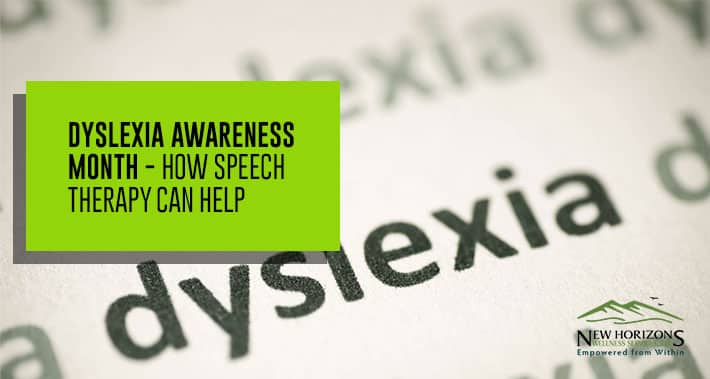
Dyslexia awareness month was instituted in order to better educate citizens about the challenges those with dyslexia must live with.
Now, one might question why we need to bring “awareness” to this disorder – surely everyone is aware of it, right?
Maybe, but what many aren’t aware of is just how much misunderstanding there is about it.
These dyslexia myths can not only be confusing to those who might have dyslexia and don’t realize it, they can also lead to harmful – but well-meaning – intervention from parents of dyslexic kids.
Here at New Horizons Wellness Services, we provide speech therapy for kids, which helps them both live with the condition itself and learn to cope with their learning difference.
Let’s talk about what’s true, and what isn’t, about dyslexia.
What Is Dyslexia?
Dyslexia is a condition where a person has difficulty with reading.
The difficulty has nothing to do with their intelligence level – someone may have below or normal intelligence, or even be otherwise gifted.
The disconnect is in the phonological component of the language – they have difficulty putting together sounds.
A neurotypical person can read fluently because they’re able to sound out the letters in their head in order to create the words in their mind.
Dyslexics have trouble with this.
The letters on the page can seem like a jumble, and have no rhyme or reason.
Common Myths About Dyslexia
Let’s look at some of the myths that we need to dispel about dyslexia that have been around far too long.
We’ve come a long way in our understanding in recent years of how dyslexia works.
But public knowledge doesn’t tend to move as quickly as specialists do.
So let’s check out the facts of the matter.
Here are some of the most common myths about dyslexia.
1. MYTH: Dyslexia Is Just Reading And Writing Backwards
You can almost imagine a teacher who might have tried to explain dyslexia simply to children in class, propagating this myth.
Even though “dyslexia” was coined way back in 1881, it has only been in recent decades that we’ve better understood the cause, so you can hardly blame teachers of old.
The Truth
This myth may even be the result of an observance by a teacher of young children – and in fact, letter reversal is common amongst children, whether dyslexic or not.
When we look at children with dyslexia as a whole, we know that while some kids DO write letters backward, not all do.
If a kid without dyslexia writes letters backward, it’s just a matter of teaching them what the right direction is.
Whereas for kids with dyslexia, the issue is much more complex.
2. MYTH: Dyslexia Is Just A Vision Problem
This one almost makes sense – after all, we tend to read visually, unless we read Braille.
Once upon a time, it was believed that a vision issue was the root cause of dyslexia.
However, a 2011 study found vision issues weren’t any more common among dyslexic kids as they were among those without dyslexia.
Sure, reading can be hard with poor vision, but it’s not what’s causing dyslexia.
The Truth
As it turns out, the problem does not lie with the eyes.
As mentioned above, what causes dyslexia is a phonetic inability.
That’s also the reason why kids with dyslexia can have problems with rhyming – they have trouble separating individual sounds and syllables from each other.
3. MYTH: If You Read To Your Kids They Won’t Get Dyslexia
Parents can be extremely judgmental, and sometimes assume the worst, even if there’s no basis in fact.
Assuming that you’re not reading to your children enough if they’re dyslexic has no scientific basis at all, and that kind of stigma can be harmful to a child.
The Truth
Reading to your kids is a GREAT idea, but it won’t change their ability to read easily or not, should they have dyslexia.
Dyslexia is a neurological condition that can’t be ‘cured’ by reading to them more.
Many children with dyslexia do love being read to, however – because it is an easy way for them to enjoy a story.
4. MYTH: Dyslexic Kids Just Aren’t Trying Hard Enough
This is another hurtful comment, implying that their motivation and integrity has something to do with how their brain works.
Kids with dyslexia can be of higher than average intelligence, as often as anyone else.
The Truth
People with dyslexia frequently work very hard to make progress in their reading skills and often work with specialists such as the ones here at New Horizons Wellness Services in order to improve.
In fact, telling a dyslexic child they just aren’t trying hard enough can be extremely damaging to their self-esteem.
As they throw everything they have into learning how to read, only to be told they aren’t trying hard enough, it may lead to them simply giving up.
After all, no amount of personal effort can change the fact that a dyslexic brain is not wired to read easily.
There are special techniques that can be used to help; a multi-sensory approach uses sound, touch, and sight as a means to this end.

5. MYTH: You Can’t Tell A Child Has Dyslexia Until School
Some people have suggested that it’s impossible to identify dyslexia until a child gets to school.
They don’t specify if it has to do with a specific-age onset, or perhaps has to do with different environment.
That’s because it’s neither.
The Truth
The truth is that dyslexia is indeed often identified once kids start attending school, but it can also show up earlier than preschool.
The reason it’s often identified in school is because dyslexia affects language skills that are used for reading.
If a child doesn’t start to learn reading before getting to school, then they may not realize until after they start trying to learn.
However, dyslexia can affect speech patterns as well.
As mentioned above, one of the key signs of dyslexia is difficulty with rhyming words.
Other signs that can show up before school, though, include:
– Difficulty pronouncing words
– Delayed beginning speech
– Problems forking words correctly
– Difficulty learning new words
– Difficulty remembering numbers, colors, or letters
– Difficulty understanding what they hear
– Difficulty remembering sequences (counting from 1 to 10, for example)
How Can A Speech Language Pathologist Help With Dyslexia?
Some people aren’t familiar with the speech language pathology field, but we’ve been around for a while.
How do we help?
As specialists in language from a scientific angle, we have studied the ways in which we speak, including how to address and sometimes correct deficits.
1. Addressing Phonological Awareness Issues
Phonological awareness issues are what cause the problems for kids with dyslexia.
Often called “pre-reading skills,” these phonological awareness skills allow humans to hear and manipulate sounds, and rearrange them into words.
They also help us understand how words are comprised, and hear their different parts.
To help children overcome these difficulties, we create opportunities for them to participate in activities that use and hone these skills.
2. Addressing Speech Errors
As well, if a child is having issues with phonological skills, they may have difficulty with many spoken sounds.
A child with dyslexia will have different speech patterns, such as replacing long sounds with short sounds, or leaving out sounds at the beginning or ends of words.
A very young child with dyslexia may be a late-bloomer in speaking, or their speech may be more difficult to understand than another child.
With these children, we slow down and show them the difference between the right and wrong pronunciations, and help them understand and practice.
3. Addressing Overall Language Issues
There may be overall language issues that need to be identified and addressed, particularly in a dyslexic child.
Grammar may be difficult, for example, but is a necessary component in language.
Additional focus can help them understand the concepts, which reflects the fact that dyslexia is not an ‘intelligence’ issue – they just need to learn it in a different way.
Book An Appointment At New Horizons Wellness Services
If your child is displaying some of the traits we’ve covered above, and you think they may be dyslexic, call now to book your appointment with us at New Horizons Wellness Services.
Alternately, if your kid’s teacher has told you they suspect dyslexia, the time is perfect to come for an assessment – if we get in early, we can help mitigate their learning difficulties.
This dyslexia awareness month, get informed on what you can do.
Yours in Health,
New Horizons Wellness Services13333 SW 68th Pkwy,
Tigard, OR 97223
- https://g.page/newhws
New Horizons Wellness Services provides a true multidisciplinary approach to mental & physical health treatments for children, adults and families.
